Ukraine Downs Eight Iranian Drones Russia Launched Against Kyiv

Russia launched an overnight drone attack on Kyiv after a 12-day break, with air defense systems destroying all the UAVs, Ukrainian military officials said Sunday.

Russia launched an overnight drone attack on Kyiv after a 12-day break, with air defense systems destroying all the UAVs, Ukrainian military officials said Sunday.
The country's air force said that the attack included eight Iranian-made Shahed drones and three cruise missiles which were shot down.
"Another enemy attack on Kyiv," Serhiy Popko, a colonel general who heads Kyiv's military administration, said in a post on the Telegram channel.
Iran has supplied hundreds of Shahed kamikaze drones to Russia since mid-2022, angering the United States and its key European allies who have imposed sanctions on a host of companies and individuals involved in their production and shipment to Russia.
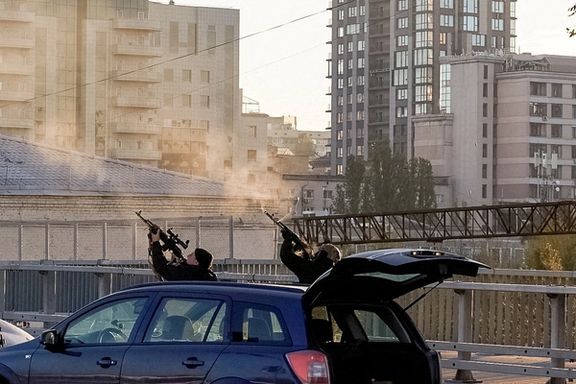
Washington has demanded that Tehran should stop its supply of weapons to Moscow if it wants to reach a new nuclear agreement and see US sanctions lifted.
Although Ukrainian forces quickly learned to shoot down most Iranian drones, Russia uses the cheap weapon to overwhelm air defenses and force Ukraine to use much more expensive Western anti-air missiles.
Three private houses were damaged as a result of falling drone debris in the Kyiv region, injuring one person, the military head of the region, Ruslan Kravchenko, said on his Facebook page.
Reuters witnesses heard blasts resembling the sound of air defense systems hitting targets. There was no immediate information about the scale of the attack.
Kyiv, its surrounding region and a number of central and eastern Ukraine's regions were under air raid alerts for about an hour after 2 a.m. local time (2300 GMT).
With reporting by Reuters, The Kyiv Independent
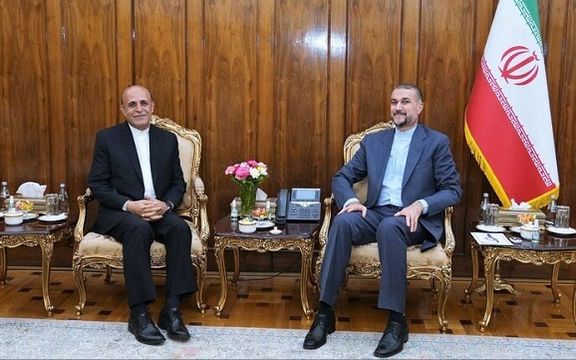
Iranian state media quoted an informed source as saying that the Islamic Republic currently has no plans to send a new ambassador to Sweden.
The state-run IRNA news agency reported Sunday that the decision was made after the burning of the Quran by a man in the European country.
This comes as local media earlier reported the administrative procedures for sending the new ambassador are completed. They also published a picture of the new ambassador Hojatollah Faghani and the Minister of Foreign Affairs, Hossein Amir-Abdollahian.
Faghani previously worked in the embassies of the Islamic Republic in Tbilisi and Brussels and was also the ambassador to Dushanbe, the capital of Tajikistan.
Two men publicly burned the Quran outside Stockholm's central mosque on Wednesday, an act approved by a Swedish court.
It was deliberately timed to coincide with the significant Muslim holiday, Eid al-Adha, further magnifying the incident's significance.
The act led to protest rallies in several Muslim countries, with Iraqis holding a large demonstration outside the Swedish embassy in Baghdad.
Iran’s foreign ministry also summoned Sweden’s charge d’affaires in Tehran.
Several Muslim nations as well as the European Union condemned the latest incident of desecration of the Quran on Saturday.
“Manifestations of racism, xenophobia and related intolerance have no place in Europe,” Nabila Massrali, the EU spokesperson for foreign affairs and security policy, expressed in a statement.
“The EU joins the Swedish Ministry of Foreign Affairs in its strong rejection of the burning of a [copy of the Holy] Quran by an individual in Sweden. This act in no way reflects the opinions of the European Union.”
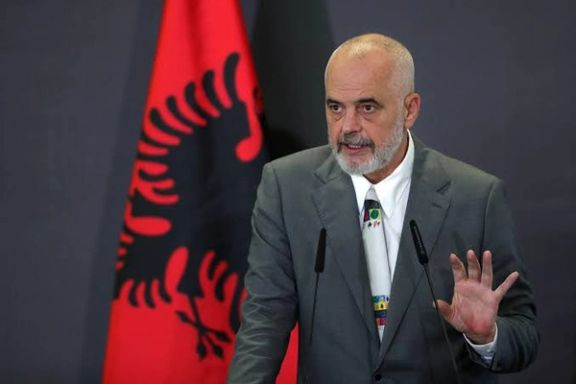
Edi Rama, Albania's prime minister, said in an interview with Der Spiegel on Friday that the Mujahideen cannot use Albania to fight the Iranian regime.
A few days ago, the Albanian State Police, on the orders of the Special Court, conducted checks in the Mojahedin-e-Khalq (MEK) camp, resulting in clashes between its residents and security forces.
The opposition group said on June 20 that hundreds of Albanian police officers raided the group's exile center, Camp Ashraf, in an unexpected move.
The group alleged one of their members, identified as Ali Mostashari, died and more than a hundred others were injured, with some hospitalized in critical condition after police raided the camp using tear gas and pepper spray and seizing computers. The group claimed the attack was instigated by the Iranian regime.
Albanian authorities denied any loss of life or injuries, saying that the incident happened due to the group’s refusal to cooperate with the police.
Police said it had suspicions that there may be people on the premises involved in cyberattacks against Tirana as well as criminal “acts of larger dimensions.”
Rama told Spiegel although the MEK are welcome, they should not use Albania as a political platform.
“Albania has no intention of being at war with the Iranian regime. Albania does not accept anyone who has abused our hospitality,” he added.
He also noted that Tirana accepted thousands of the MEK members under a life-saving operation at the request of the Obama administration in 2016.
“Our country is used as a trench in a war that is not ours, it does not work! Of course, they have every right to fight for their freedom, but to do so they must leave Albania,” the prime minister noted.
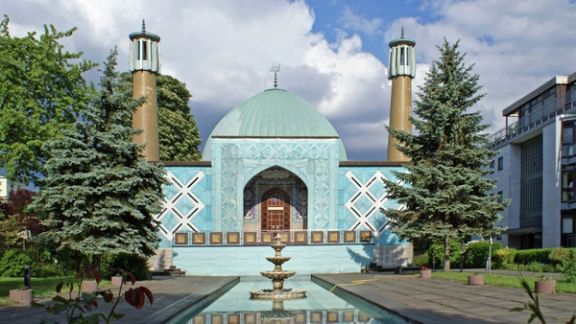
The German Federal Administrative Court ruled that the Blue Mosque, an Islamic center in Hamburg affiliated with the Iranian regime, is an "extremist Islamic organization."
Despite an objection and complaint filed by the center, the Administrative Court of Hamburg upheld the classification of the center's activities as "extremism" by the Federal Office for the Protection of the Constitution of Germany.
The Court began hearing the complaint of the Islamic Center of Hamburg two months ago. However, the decision did not confirm findings by security organs that the center acted as an extension of the Iranian regime in Germany.
Previously, intelligence officials in Hamburg published documents that showed the connection of this center with extremist and Islamist groups, including Lebanon’s Hezbollah.
However, the center claims to be a purely religious foundation that deals with the religious affairs of the Shias.
Earlier, the Secular Islamic Association had asked Germany's Minister of the Interior in a letter to terminate all cooperation with the Central Council of Muslims immediately.
Additionally, the letter said that the Islamic Center of Hamburg promoted Iran's ideology and monitored Iranian citizens in exile as well as disseminating anti-Semitism.
Hamburg's local authorities expelled Seyed Soleiman Mosavi-Far, the deputy for the Islamic Center in November, accusing him of close ties to terrorist groups.
Aside from his involvement in and support for extremist and terrorist Shia organizations, Mosavi-Far had connections with two organizations providing financial assistance with connections to Hezbollah in Lebanon, according to German authorities.
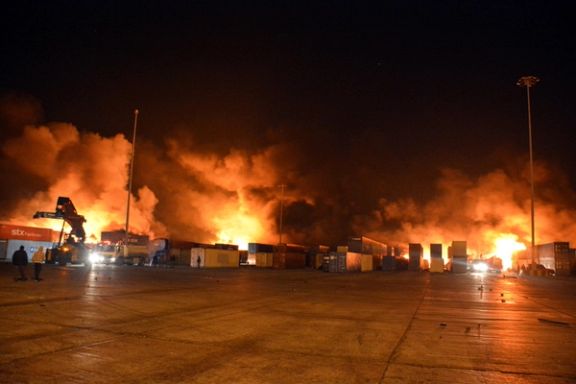
Israel carried out airstrikes near the central Syrian city of Homs early Sunday causing material damage but no casualties, the Syrian military said in a statement.
Israeli authorities did not comment on the airstrike on Homs but said one of the Syrian air defense missiles exploded over northern Israel without causing any damage.
Israeli army spokesman Avichay Adraee later said that Israel's military retaliated for the firing of the air defence missile that exploded over the country's north, by attacking Syrian air defense batteries from where the missile was fired.
It is not clear if the Syrian missile was launched during the air attack near Homs and strayed into Israeli airspace, or deliberately targeted Israel.
Syria uses Russian air defense systems and in recent months Russian forces have been altering these missiles to hit ground targets in Ukraine.
A large segment of the Syrian missile fell in Israel
But in 2022 also a Syrian air defense missile exploded over northern Israel and this could have been a similar incident, although the Israeli air force retaliated against the Syrian missile battery.
Residents of central and southern Israel reported hearing a large blast, according to Times of Israel, and shrapnel was recovered from what appeared to be parts of a surface-to-air missile from a Russian-made S-200 system.
Israel has in recent months intensified strikes on Syrian airports and air bases to disrupt Iran's increasing use of aerial supply lines to deliver arms to allies in Syria and the Lebanese Hezbollah. However, there were fewer reports of attacks in June.
Syrian state media said air defense's intercepted Israeli missiles across central parts of the country, downing most of them. A Syrian army statement said missiles that flew over parts of Lebanon's capital Beirut hit locations in the vicinity of the city of Homs, resulting only in material damage.
Claims by Syrian authorities cannot be independently verified.
After a mid-air explosion heard across Israel, remnants of the Syrian missile landed in Rahat, a town some 180 km (110 miles) south of the armistice line between the countries, Israeli police said. There was no word of any casualties.
Local media showed what appeared to be the blackened front end of a large missile, standing upright in an open area among residential buildings, and tail-fins in a field.
The Israeli military said its warplanes were unscathed.
The Israeli strikes are part of an escalation of what has been a low-intensity conflict continuing for years with a goal of slowing Iran's growing entrenchment in Syria, Israeli military experts say.
Tehran's military presence has grown in Syria since it began supporting President Bashar al-Assad in the civil war that started in 2011.
Thousands of Afghan, Iraqi and other militias trained, supplied and paid by Iran, in addition to the Lebanese Hezbollah, now hold sway in areas in eastern, southern and northwestern Syria and in several suburbs around the capital.
Documents hacked from the foreign ministry by an Iranian opposition group in May revealed that Bashar al-Assad’s government owes Iran $50 billion dollars, excluding Tehran’s direct military expenditures in the civil war.
With reporting by AP and Reuters

An Iranian member of parliament has warned about a looming crisis triggered by medicine shortage, saying that nearly 200 medications are not available.
Mohammad-Ali Mohseni-Bandpey, a member of the parliament's health committee warned in an interview with ILNA news website on Saturday that if a solution is not found, the issue may turn into a social, political, economic, and health crisis.
He said the government's huge debts to the social security organization and the organization's debts to hospitals, as well as the lack of sufficient drug production in the country are the most important factors contributing to the crisis.
During the past years, the authorities attributed medicine shortages in the country to the US sanctions, claiming that the sanctions targeted ordinary people. However, import of humanitarian items, including medicine, is exempt from US embargoes. In fact, Iran has been purchasing around two billion dollars' worth of medicines and raw materials annually for producing drugs from Europe and India.
The Foundation for the Defense of Democracies had previously written in a report that corruption, not sanctions, is causing medicine shortages in Iran.
While European countries had launched the INSTEX mechanism with the permission of the US to export humanitarian items to Iran, they discontinued it in March of last year because of Iran's unwillingness to use this mechanism.
In a joint statement in March, Germany and France said the Iranian leadership has chosen to act against the interests of its people by refusing to cooperate in the export of medicine and other life-saving goods.
Bandpey further noted that in a meeting held last week, the ministers of labor, health, intelligence and the representatives of the Central Bank, as well as the Revolutionary Guard acknowledged that if a solution is not found, this issue may turn into a big problem.
He also referred to the 180-million-dollar debt of the social security organization to hospitals and the government's “ten times larger” debt to this organization, saying that there is a shortage of medicine even in the emergency rooms of hospitals and people have to look for medicines outside the hospital, meaning in the black market.
He underlined that the country cannot produce enough drugs, because the cost of the medicines is more than government mandated prices. Iran's economy is mostly controlled by the government, especially imports of goods, which needs foreign currencies.
Earlier this year, Bandpey said the pharmaceutical companies are moving to other countries as there are "serious hurdles” to their activities.
In January an official of Iran’s drug importers union, Mojtaba Bourbour, challenged government officials’ claims about self-sufficiency in production of medicines and said not only up to 90 percent of raw material is imported from countries such as China and India, but also some medicines are imported from China but sold under Iranian labels.